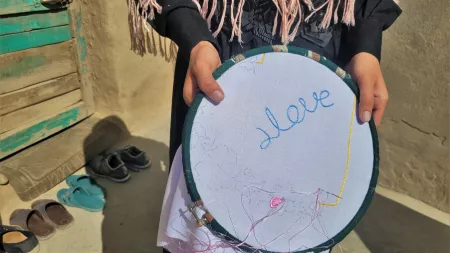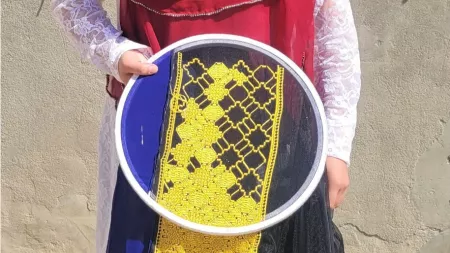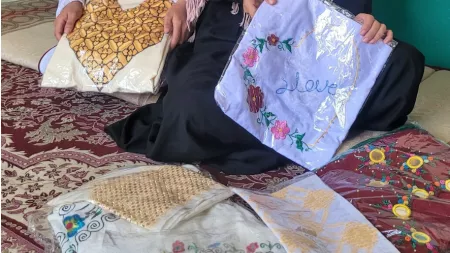The school uniform is laying on the bed. The school bag is sitting next to it. Fatima checks the bag one last time to see if everything is packed. She had already prepared her bag yesterday evening, but she just wants to make sure. In front of the school many excited girls are waiting for the gate to open. Many have come very early, even hours before school is supposed to start. Then a teacher comes out to meet the girls and tells them that they have to go home. They have to go home because they are girls. Secondary school will not open for girls today. It is the 23rd of March 2022.
“I cried every day, after I was told that the schools are still closed. This was a very dark day for girls. At first it was hard for me to believe. I think we were all shocked,” remembers Fatima, 18. She would have been going to the 11th grade. “When I was a little girl in school, I saw girls wearing very nice and special clothes. I asked my teacher about it and she told me that they were wearing their graduation clothes. I wanted to know if one day I will also be wearing those clothes and was very happy when she said yes. But I never reached that level,” continues Fatima sitting next to her sister Zahra on a cushion on the floor in the living room.

She has not been to school for three years now. First due to the COVID-19 pandemic, now the restrictions are depriving a whole generation of women and girls of their right to education. “I lost my hope. Not being able to go to school has a negative effect on every girl. I feel depressed and mentally stressed. When I look into the future it is dark. We suffer every day without school. We had ambitions, but now we lost ourselves,” says Fatima. She wants to be a doctor, but given the current restrictions she will not be able to attend university and study to become a doctor.
This will also have a negative effect on women’s access to health services in the future. There will be a lack of female doctors, nurses, midwives, and nutrition counselors. Without adequate medical education for women, there will not be trained female healthcare workers. Culturally, women however need female healthcare workers to treat them, as this cannot be done by a man. Women are already often struggling to access health care due to costs, including for transportation to a health facility, and for medications and supplies for which patients are obliged to pay. This will only worsen with girls not going to school.

“Now I only have free time. I am very grateful to be able to join CARE’s small savings group. It helps me to stand on my own two feet. I learnt how to save money for myself and how to start a business. I do embroidery now and now have a little hope,” explains Fatima while smoothing out the wrinkles in the packaging of her work. She is holding a piece of linen fabric with flower embroidery, which she wants to sell as a tablecloth. Women and girls receive trainings in handicraft skills by CARE, but also on how to save money and how to generate income through business. Fatima and her sister Zahra, 22, sell their embroidery on the local market. They go and find a small shop owner in between food stalls in the bustling city of Kabul, who might buy their handicraft. “I am always scared when we go out to sell our work,” says Zahra because of the security situation in her hometown.
Once they found someone who is willing to buy it, they hurry back home. “It is only a little profit, but it helps our family.” Zahra and Fatima’s father lost his job a few months ago. He was a driver but the owner of his rental car needed the car back to sell it because the economic situation has worsened. “I am grateful, that Fatima helps the family, but I want her to be able to continue her education and fulfill her wishes,” says Zainab, the girls’ mother. She cried a lot when she heard the news that Fatima had to stay home and could not go to school. “My message to the world is to open the doors to schools again, so girls can reach their hopes and wishes, and we mothers can stop crying.”
